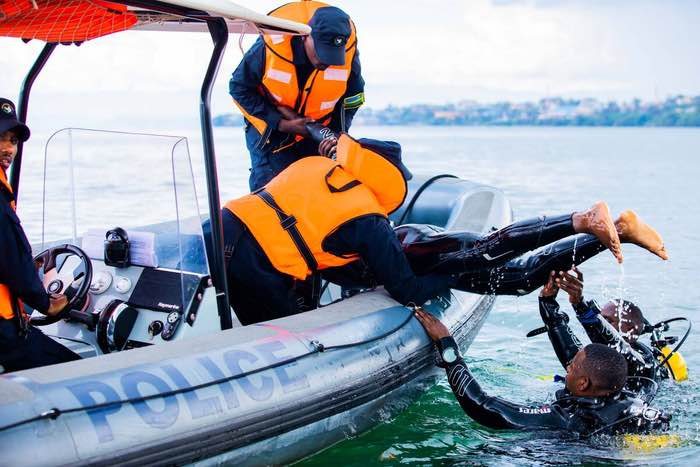
Twenty Police officers, on Tuesday, November 14, completed a four-week Police marine ‘Coast Guard Functions’ course conducted in Lake Kivu in Rubavu District.
The Deputy Inspector General (DIGP) in charge of Administration and Personnel, Jeanne Chantal Ujeneza, presided over the pass-out of the first intake of the basic course facilitated by Coast Guard experts from Italy.
DIGP Ujeneza said that Rwanda National Police (RNP), in its course to accomplish its duties to ensure the safety of the people and their property on ground, air, maritime and cyber space; it prioritizes building the capacity of its personnel to professionally handle tasks at hand.
She added that maritime operations are among the RNP priorities and crucial in the fulfillment of the institutional mandate.
“This and many other marine courses conducted before, are meant to build the capacity of our marine unit officers in all marine operations in water bodies,” DIGP Ujeneza said.
She added that it’s paramount for the RNP to consistently develop and enhance knowledge and skills of its personnel in all specializations, including how to handle all incidents, and to investigate any incident in water bodies, both in Rwanda and abroad where Rwandan Police officers are deployed.
She thanked the Italian Coast Guard trainers and the strong cooperation between Rwanda and the Italian Carabinieri.
She also reminded the trainees that the acquired skills and knowledge should not be perishable but of additional value to maritime security and safety of people in water bodies.
Commander Vincenzo Cascio, the head of the Italian Coast Guard Mobile Training Team, thanked Rwanda and RNP in particular for the hospitable reception.
“These trainees have learned the basics of marine environmental protection, main pollution control techniques, organizational requirements of a search and rescue system, and the international standard procedures for search and rescue operations,” Commander Vincenzo said.
The course also explored the international standard requirements for protecting ships and port facilities from unlawful acts, and how to carry out a port facility security assessment, recognizing vulnerabilities and applying appropriate mitigation strategies.
Other modules include the basic safety requirements for different types of ships and safety of navigation international regulations.
“They are now able to carryout a proper casualty investigation, applying the procedures provided by the international maritime organization casualty investigation code,” said Commander Vincenzo. (End).
